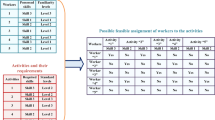Abstract
A multiskilled project portfolio scheduling problem (MSPPSP) is an extension of a multiobjective multimode resource-constrained project portfolio scheduling problem that is generally propounded to schedule a set of projects performed by human skills in an organization. The main idea of the MSPPSP is to consider resources that are called staff members to perform projects’ activities in different required skills. Since the required staff members have various skills, different combinations of skills are applied to accomplish the project. These definitions cause to encounter a huge number of modes while performing activities of a project. In this paper, a novel goal programming model for the multiobjective MSPPSP with precedence constraints that aim at finding a minimum deviation from the expected time to complete each project and assignment of resources is presented. To solve such a hard problem, an efficient metaheuristic algorithm based on differential evolution (DE) is developed. To evaluate the efficiency of the proposed DE algorithm, the results are compared to the results of the tabu search algorithm and the optimal results. The comparison confirms the effectiveness of the DE algorithm. Finally, regarding the size of organizations in terms of staff members, the maximum number of the determined structure projects, which is performable with minimum delay from aspiration times, is examined.
Similar content being viewed by others
References
Neron E, Boptista D (2002) Heuristics for the multi-skill project scheduling problem. International Symposium on Combinatorial Optimization, Paris
Bellenguez-Morineau O and Neron E (2005). Lower bounds for the multi-skill project scheduling problem with hierarchical levels of skills. In: Burke EK and Trick M (eds) Practice and theory of automated timetabling, Lecture Notes in Computer Science, vol. 3616, Springer, 229–243
Artigues C, Demassey S, Neron E (2008) Resource constraint project scheduling problem. Wiley, New York
Dauzere-peres S, Roux W, Lassere JB (1996) Multi-resource shop scheduling with resource flexibility. Eur J Oper Res 107:289–305
Valls V, Pérez A, Quintanilla S (1996) A graph colouring model for assigning a heterogeneous workforce to a given schedule. Eur J Oper Res 90(2):285–302
Ballou D, Tayi G (1996) A decision aid for the selection and scheduling of software maintenance projects. IEEE Trans Syst Man Cybern Syst Hum 26(2):203–212
Alfares H, Bailey J (1997) Integrated project task and manpower scheduling. IIE Trans 29(9):711–717
Campbell G (1999) Cross-utilization of workers whose capabilities differ. Manag Sci 45(5):722–732
Campbell G, Diaby M (2002) Development and evaluation of an assignment heuristic for allocating crosstrained workers. Eur J Oper Res 138(1):9–20
Bassett M (2000) Assigning projects to optimize the utilization of employees’ time and expertise. Comput Chem Eng 24(2–7):1013–1021
Wu MC, Sun SH (2006) A project scheduling and staff assignment model considering learning effect. Int J Adv Manuf Technol 28(11–12):1190–1195
Corominas A, Pastor R, Rodriguez E (2006) Rotational allocation of tasks to multifunctional workers in a service industry. Int J Prod Econ 103(1):3–9
Alba E, Chicano FJ (2007) Software project management with GAs. Inf Sci 177(11):2380–2401
Gutjahr WJ, Katzensteiner S, Raiter P, Stummer C, Denk M (2008) Competence-driven project portfolio selection scheduling and staff assignment. Cent Eur J Oper Res 16:281–306
Valls V, Perez A, Quintanilla S (2009) Skilled workforce scheduling in service centres. Eur J Oper Res 193:791–804
Charnes A, Cooper WW (1961) Management models and industrial applications oflinear programming. Wiley, New York
Ignizio JP (1983) GP-GN: an approach to certain large scale multi-objective integer programming models. Larg Scale Syst 4:177–188
Taylor B, Moore L, Clayton E (1982) R&D project selection and manpower allocation with integer nonlinear goal programming. Manag Sci 28(10):1149–1158
Yoshimura M, Fujimi Y, Izui K, Nishiwaki S (2006) Decision-making support system for human resource allocation in product development projects. Int J Prod Res 44(5):831–848
Heimerl C, Kolisch R (2009) Scheduling and staffing multiple project with a multi-skilled workforce. OR Spectr 32(2):343–368
Storn R, Price K (1995) Differential evolution: a simple and efficient adaptive scheme for global optimization over continuous spaces. Technical Report TR-95-012. International Computer Science Institute, Berkeley
Storn R, Price K (1997) Differential evolution—a fast and efficient heuristic for global optimization over continuous spaces. J Glob Optim 11:341–359
Greco S (2004) Multiple criteria decision analysis: state of the art surveys. Springer, Berlin
Bazaraa MS, Sheraly HD (1993) Nonlinear programming, 2nd edn. Wiley, New York
Lawler EL (1963) The quadratic assignment problem. Manag Sci 9:586–599
Babu BV, Jehan MML (2003). Differential evolution for multi-objective optimization. In Proceedings of 2003 Conference on Evolutionary Computation (CEC-2003). Canberra, 2696–703
Gämperle R, Müller SD, Koumoutsakos P (2002). A parameter study for differential evolution. Advances in Intelligent Systems, Fuzzy Systems, Evolutionary Computation, 293–298
Siarry P, Michalewicz Z (2008) Advances in metaheuristics for hard optimization. Springer, Berlin
Lorenzoni LL, Ahonen H, Alvarenga AG (2006) A multi-mode resource-constrained scheduling problem in the context of port operations. Comput Ind Eng 50:55–66
Damak N, Jarboui B, Siarry P, Loukil T (2009) Differential evolution for solving multi-mode resource-constrained project scheduling problems. Comput Oper Res 36:2653–2659
Seifi M, Tavakkoli-Moghaddam R (2008) A new bi-objective model for a multi-mode resource-constrained project scheduling problem with discounted cash flows and four payment models. Int J Eng Trans A Basic 21(4):347–360
Glover F (1986) Future paths for integer programming and links to artificial intelligence. Comput Oper Res 13(5):533–549
Glover F (1989) Tabu search—part I. INFORMS J Comput 1(3):190–206
Glover F (1989) Tabu search—part II. INFORMS J Comput 2(1):4–32
Author information
Authors and Affiliations
Corresponding authors
Rights and permissions
About this article
Cite this article
Kazemipoor, H., Tavakkoli-Moghaddam, R., Shahnazari-Shahrezaei, P. et al. A differential evolution algorithm to solve multi-skilled project portfolio scheduling problems. Int J Adv Manuf Technol 64, 1099–1111 (2013). https://doi.org/10.1007/s00170-012-4045-z
Received:
Accepted:
Published:
Issue Date:
DOI: https://doi.org/10.1007/s00170-012-4045-z




